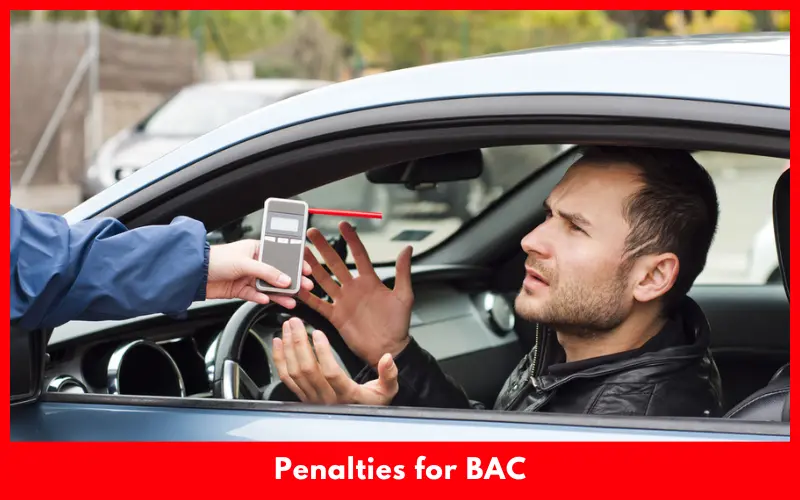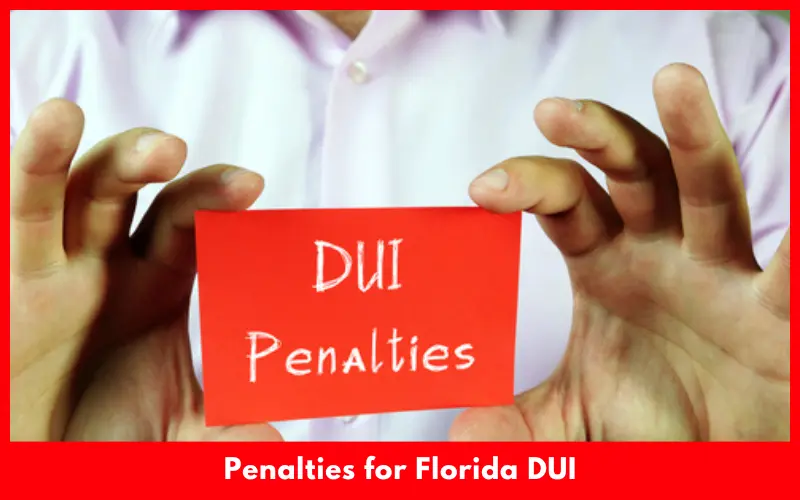If you’re found to have a BAC of 0.15% or higher, you may face additional penalties. For a first-time Florida DUI offender with a high BAC, you could be looking at higher fines of $1,000 to $2,000.
In the US, in 2023, 20 per cent of drivers said that, once a year, they drove a car drunk; and 10 per cent said they did it fairly often. The Florida DUI penalties include fines, jail time, and other punishments.
For your first offense, a combination of fines, license suspension, probation, and a mandatory period DUI school will be meted to you. For two or more repeat offenses, punishment will not be any better, with an increased length of license suspension, fines, or even jail time.
Article Summary
- Factors To Know About Florida DUI (Driving Under The Influence)
- Legal Blood Alcohol Limit
- Types of DUI Offenses
- Administrative License Suspension
- Mandatory Penalties for DUI
- Enhanced Penalties for High BAC
- Ignition Interlock Device Requirements
- DUI Diversion Programs
- Impact on Driver’s License
- Florida’s Implied Consent Law
- Hiring a DUI Attorney
- Conclusion
Factors To Know About Florida DUI (Driving Under The Influence)
That’s part of what we’ll share, and by what we share I mean for you to learn DUI laws of the state. You might have heard a few things already about the state’s DUI laws, yet move further into what you might not know by now.
Learn DUI laws of the state, what happens, the options you may be presented with if you ever are charged with DUI, and what it can mean if you ever do face DUI.
Legal Blood Alcohol Limit
If you are driving in the state of Florida, you need to know that 0.08 per cent is the legal limit set for blood alcohol in a human body. In other words, if your body has alcohol content of 0.08 per cent, you would be considered ‘legally drunk’. It is illegal in the state of Florida to drive under the influence of alcohol or other drugs.
In Florida, if law enforcement has reason to suspect that a motorist has been drinking, they will administer either a breathalyzer test or conduct a field sobriety test. Drinking in excess of a couple drinks can have an impact on you being able to drive carefully.
For first-time offence of a DUI, there will be a minimum fine of 500 USD, with possible license suspension of up to a year, especially if the reading is 0.08% or above. According to DUI accident lawyer Matthew D. Easton, penalties for driving with a BAC of 0.08% or higher can include fines, license suspension, and even jail time. If you do not want to receive DUI penalty, then do not drink any alcohol if you are planning to drive.
Types of DUI Offenses
It could represent a first-time conviction, with an offender probably facing only a misdemeanour charge; or it could be a multiple-DUI conviction, with a range of aggravating factors. For instance, a first-time conviction could be upgraded to a serious charge if there were additional circumstantial aggravating factors (eg, a high blood alcohol concentration (BAC)) or aggravating behaviour (eg, a minor passenger).
Additional DUIs that occur in a given time-frame merit harsher legal repercussions, including longer licence suspensions, stiffer fines and potentially even jail time. If a DUI offence causes injuries or death to another person, the offence can rise to the level of a felony – a serious crime that brings significant legal ramifications.
Administrative License Suspension
If you are arrested for a DUI in Florida, you are on the rope and the DHSMV can just pull it for you administratively In Florida, your driver’s licence can be suspended for a DUI charge immediately and administratively by the Department of Highway Safety and Motor Vehicles (DHSMV). The length of the revocation depends on whether or not you submitted to the breath test, and on whether or not you had any prior convictions.
If you fail the test or refuse to take it, your licence will be suspended for between six and 18 months for a first offence – accompanied by a second administrative punishment, entirely separate from what a courtship licence might let you drive to work or school during suspension.
Mandatory Penalties for DUI
The penalties for DUI in Florida are quite severe. A conviction for a Florida DUI offense results in a fine of $500 to $1,000 for a first offense DUI. Resolution of the case may also include jail time for a maximum of six months, impoundment of your vehicle, and suspension of your driver’s license for at least 180 days. DUI School, Community Service Hours and Probation are also often part of a resolution.
The penalties are stiffer for a second drunken-driving offence within five years of the first: fines up to $2,000, nine months’ jail, forfeiture of your vehicle, and a suspension of your licence for at least five years.
These penalties are mandatory and can have far-reaching consequences on your personal and professional life. Seeking legal assistance to help you through the legal process and explaining the penalties to you is essential, as well as assisting with reductions.
Enhanced Penalties for High BAC
A BAC of 0.15 or greater can incur further sanctions. A person convicted of a DUI with elevated BAC, in advance of the first offence, is probably looking at fines of $1,000-$2,000, if it is a first-offence DUI, and a revocation of the licence for up to 12 months, and an ignition interlock installed in a vehicle.

If this is a second or subsequent DUI, with high BAC, the fine can be as much as $2,000 to $4,000, with jail time on the rise, and be required to take a substance use course or treatment programme.
Ignition Interlock Device Requirements
Ignition interlocks prevent drivers with a high BAC from driving. An ignition interlock is a breathalyzer that is installed in a vehicle. The vehicle won’t start until the driver blows into the device.
If the driver’s level of blood alcohol concentration (BAC) is greater than the cutoff level (usually 0.02%), then the car won’t start. In Florida, ignition interlock devices are required for those convicted of DUI, especially repeat offenders and those whose BAC is high.
The driver is directly responsible for installation and maintenance of the ignition interlock device as well as the costs associated with the device, including installation and monthly fees. Failure to comply with the requirements for the ignition interlock device can result in even more penalties and consequences, so why not do what is required of Florida DUI laws?
DUI Diversion Programs
You may be eligible for a DUI diversion program if you are charged with a DUI and want to seek an alternative to the formal legal process. Florida DUI diversion programs allow any person over 21 (other age restrictions apply in Orange County) who is normally eligible for probation to have his or her DUI charge dismissed if the individual completes the program.
The program, called the Back on Track program in Florida, typically requires the individual to complete educational courses, perform community service, take some form of substance abuse or alcohol abuse treatment and check regularly with a probation officer.
One reason to complete a DUI diversion programme is that you might get a better outcome than had you continued through the standard judicial process (and potentially earned a conviction on your record). A DUI diversion programme shows your willingness to resolve the issues that led to the DUI offence in a way that might be viewed positively by the court.
Whether or not a proposed candidate qualifies will depend on the elig – so discuss your case with a lawyer to see if a DUI diversion programme is right for you. Should you qualify and complete the programme successfully, you could avoid some or all of the penalties of a DUI conviction.
Impact on Driver’s License
You may have your licence suspended administratively after an arrest for DUI. After a conviction, you will be suspended for anywhere from 180 days to several years, depending on your circumstances. After a first offence, your license may be suspended between 180 days and as long as a year. After more than one offence, your suspension could be longer or permanent.
In some cases, it might be possible to obtain a hardship licence – also known as a ‘restricted’, ‘limited’ or ‘workers’ licence – and drive to work, school or on other extenuating circumstances during the period of suspension. But you still have to comply with all of the rules and parameters of such a licence.
Refuse to blow into a breathalyser, for example, at the time of arrest – under Florida’s implied consent law – and your license is automatically suspended ( the one that would flow from conviction of a DUI and can carry its own penalty).
Florida’s Implied Consent Law
It provides that, when you choose to drive a car in the state of Florida, you have automatically agreed to undergo a chemical test if an officer suspects you’re driving while under the influence of alcohol or drugs, and if you refuse, you’ll face harsh consequences, including mandatory driver’s licence suspension.
If you refuse to take the breath, blood or urine test when law enforcement asks for it, then your licence can be suspended for one year in the event of your first refusal, and 18 months for prior refusals. The refusal to submit to the test can be used against you in court and can lead to further penalties in connection with your DUI case.
Specifically, you have the right to refuse the roadside officer’s breath analysis test, but declining the chemical test following the arrest can have consequences. you are always permitted to refuse a roadside officer’s breath analysis test. However, a refusal of the chemical test will have consequences. It is important to know your rights and the ramifications of Florida’s Implied Consent Law to help guide you on your decision-making in the event of being suspected of DUI
Hiring a DUI Attorney
If you have been arrested for diving under the influence of alcohol and are living in Florida, you will need a DUI attorney; a DUI attorney is a lawyer that defends those that have been caught driving under the influence and can help you with the complicated system.
If you have hired a good DUI attorney, then you have lifted yourself up out of the mess you are in to a much better place. Your attorney knows DUI laws, DUI judgments, and can construct a good DUI defence for you to use when the prosecution refuses to back down. Specifically, your attorney will: tell you your rights and explain what you need to do tell you what to do; and represent your interests in court.
An expert DUI lawyer can also help fulfill this function by negotiating with prosecutors in an effort to reduce charges or penalties. The lawyer you select makes a significant difference in how well you fare with your DUI.
Conclusion
Florida takes driving under the influence (DUI) seriously. You will face dual consequences if you are arrested for DUI in Florida: After you are arrested for DUI in Florida, you will face two separate issues. One set of consequences can be imposed only by the Department of Highway Safety and Motor Vehicles (DHSMV); another set of consequences can be imposed by the court.
Take note or consult an attorney, and make a decision to not risk a DUI charge that could hurt you for years to come. Drink responsibly, but please, drive responsibly too.

